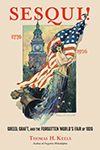
In 1916, department store magnate and Grand Old Philadelphian John Wanamaker launched plans for a Sesqui-Centennial International Exposition in his hometown in 1926. It would be a magnificent world's fair to celebrate the 150th anniversary of the Declaration of Independence. Wanamaker hoped that the "Sesqui" would also transform sooty, industrial Philadelphia into a beautiful Beaux-Arts city. However, when the Sesqui opened on May 31, 1926, in the remote, muddy swamps of South Philadelphia, the first visitors were stunned to find an unfinished fair, with a few shabbily built and mostly empty structures. Crowds stayed away in droves: fewer than five million paying customers attended the Sesqui, costing the city millions of dollars. Philadelphia became a national scandal—a city so corrupt that one political boss could kidnap an entire world's fair. In his fascinating history Sesqui!, noted historian Thomas Keels situates this ill-fated celebration—a personal boondoggle by the all-powerful Congressman William S. Vare-against the transformations taking place in America during the 1920s. Keels provides a comprehensive account of the Sesqui as a meeting ground for cultural changes sweeping the country: women's and African-American rights, anti-Semitism, eugenics, Prohibition, and technological advances.
Thomas H. Keels is a historian and lecturer who has authored or co-authored seven books and numerous articles on Philadelphia history. A confirmed taphophile, Keels has been a tour guide at Laurel Hill Cemetery, Philadelphia's premier Victorian necropolis, for two decades.
Description courtesy of Temple University Press.
Watch PA Books and more PA History and Culture on cable and the PCN Select Streaming Service.